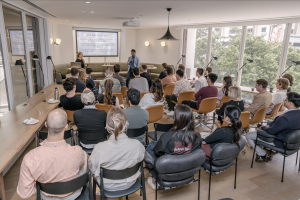Three years ago, Kiwi entrepreneur Mahesh Muralidhar (an early leader at Canva, the COO at Simply Wall St. and a senior exec at Airtasker) announced that he’d returned to NZ with a bold vision: to produce 10 New Zealand technology unicorns (or ‘kiwicorns’) by 2026 through a brand-new incubator program.
Phase One Ventures has had an incredibly successful first year even against what the startup ecosystem has dubbed the ‘tech wreck,’ with what it says is stronger stats than any other such facility across the ANZ startup ecosystem.
Ten of its community (of 31 startups) have gone to market to raise – all successfully.
They’ve secured funding at globally competitive levels from local and global VCs, Kiwi A listers and blue chip Silicon Valley founders.
What’s more, 45% of startups in the Phase One community have a female founder which is well above global averages.
Here, Mahesh shares what he’s learnt so far about raising ‘Kiwicorns’…
The need for ‘different’ thinking…
As an incubator, we’ve been called ‘small but mighty’ – and I like to believe that’s a direct result of thinking and operating very ‘differently’ to conventional incubators.
A year ago, I went public with the statement that startups don’t work out because they don’t build something that people love. It’s not a lack of capital; you just need to build a great product that a whole bunch of people want, which is incredibly hard. Phase One Ventures was founded with this principle at its heart – we believe that entrepreneurs who are focussed on a problem, are in it for the long haul and are customer obsessed can achieve their dreams.
Our (free) incubator addresses significant gaps inherent in more traditional programmes in NZ – including access to experienced product and growth operators; and whereas most incubators focus on acceleration; startups ll come out of our programme with a product that customers love which is ready for scale. We call this a ‘culture of customer and problem obsession’.
In line with this, we choose who is part of our community (now 30 strong) based on a set of values as opposed to an assessment on TAM, competitive landscape or go-to-market strategy (because no one knows this for sure for very early stage startups).
To uncover if startups align with our approach, we ask founders three questions:
- Are you in for the long haul and can you stay lean for that period?
- Are you evidently customer obsessed?
- Are you conscious about what you want to get out of this?

A Phase One gathering. Photo: Supplied
Challenging conventional approaches…
Some of our beliefs, too, fly in the face of convention:
It is NOT about ideas. To build a great product, founders have to spend extensive time in the problem space.They have to spend 6-12 months, researching, utilising best in class interview, assessment and analysis practices to build a deep understanding of the problems, customers personas and channels in the space.
Stop making ‘wild guesses in a dark room.’ In our opinion – all of this should be done on a shoestring. Founders should find ways to be sustainable. You can do this discovery through research or through revenue. This also allows founders to build deep intuition and instinct around customers and the markets. There is so much pressure from society, the ecosystem and media that founders should have answers, should build, should be producing explicit tangible output…we disagree. We believe acceleration, speed, hectic growth and a high experimentation environment kicks in post building this deep foundation. Otherwise founders are making wild guesses in a dark room. The persona that will solve and help the founders the most on their journey is … the customer.
Fundraising is a skillset not just a process. We have realised as we have supported our founders that fundraising is a skillset that founders have to pick up. We believe that founders need to set aside 4-6 weeks to prepare for a fundraise. This reduces the heartache and anxiety that founders go through in executing on capital strategy which is a key part of building a high growth business. The wonderful thing about setting this time aside is we have seen founders build remarkable levels of clarity on the business, themselves and the clear next steps they have to take.
Go slow! Finally it is critical that founders have a clear opinion on their personal end goal as well as a strong hypothesis on an end milestone/story for the business. They should have reverse engineered from their end goals to have clear strategic milestones. All of these steps take time! Go slow, be conscious, prep and go as long as you want. We want every one of our community founders to win.
Come over for a cuppa…
Lastly, but importantly, VC shouldn’t ever be a one-size-fits-all, three-month solution. We’re aiming to build very deep relationships over a year of intensive focus. When something goes wrong; or when it goes right – we want the founders to have their mentors on speed dial; to have the kind of relationships that see them call in for a xuppa; sit at the kitchen bench and talk through sticky issues.
More on Phase One here.




















Trending
Daily startup news and insights, delivered to your inbox.